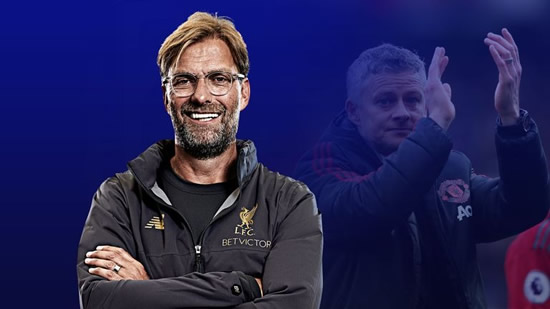Why Manchester United should learn from Liverpool's structure
Posted Wednesday, June 05, 2019 by Skysports.com

Jurgen Klopp's Liverpool are on top but what next for Ole Gunnar Solskjaer?
Manchester United need to heed the lesson of Liverpool but will they get it right or will they make another misstep instead? New thinking is needed at Old Trafford, writes Adam Bate.
Liverpool's Champions League triumph and the subsequent outpouring of joy in the city will have been enough to send Manchester United supporters scurrying for cover this summer. But painful as it will be to see their great rivals on top, there are lessons to learn from the success of Jurgen Klopp's team. Are those lessons likely to be heeded at Old Trafford?
Having already turned to Ole Gunnar Solskjaer and Mike Phelan on the basis that they understand the club, there have since been suggestions that Rio Ferdinand and Darren Fletcher, two men with no experience in the role, could head up the club's new transfer committee - one that is designed to emulate Liverpool's approach and move away from the scattergun strategy that has undermined United's recruitment in recent years.
While the mere mention of Liverpool as the model will be jarring for some - remember the criticism thrown at David Moyes when he described Manchester City as "the level we need to try and aspire to get ourselves to" - the bigger issue is not one of pride but practicality. Is there really going to be a correction of course or just another Manchester United misstep?
United have been scarred by their experiences when attempting to import philosophies that were deemed at odds with their own. The marriage of inconvenience with Jose Mourinho. The step back in time with Louis van Gaal. It is no wonder that the appointment of former hero Solskjaer will have felt like a warm embrace for staff and supporters alike.
Embracing tradition always plays well but United need knowledge not anecdotes about Sir Alex Ferguson. This club does not need history lessons, not really. They need help in the present to succeed in the future. The need the right people making the right decisions. Rather obviously given the size of Manchester United, those people should be best in class.
Van Gaal himself waded back into that debate this week. In one breath, he accused Ed Woodward of knowing nothing about football. In the next, he cast doubt over the suitability of Ferdinand as a sporting director. "It's more or less what is happening now with Solskjaer," he told the Guardian. "Ex-players, old boys' network. It's not always a good choice."
Their rivals have got it right. Manchester City have retained Brian Kidd on the coaching staff and they deploy Mike Summerbee as a high-profile ambassador. City Square at the Etihad Stadium ensures that there is a visible connection to the past on a matchday. But the decision-making is in the hands of those best placed to make the best decisions.
Nobody could accuse Liverpool of being a club that is out of touch with their traditions, but even they moved away from the boot-room culture to find another way. Sir Kenny Dalglish is an ambassador not the manager. Klopp was a good fit and someone willing to throw himself into all things Anfield but he was also an outsider who could bring fresh ideas.
"The intensity of football in Liverpool is very good for me," said Klopp when he was appointed. His old sporting director Christian Heidel agreed that he would respond well to the emotions there. But Klopp was no former player and he had no direct connection to the club or the city. The same is true of those key protagonists behind the scenes at Liverpool.
Mike Edwards, Liverpool's celebrated sporting director, was born in Southampton and studied in Sheffield. He worked as an analyst for Portsmouth and Tottenham before moving to Liverpool. Mike Gordon, the club's director, grew up in Milwaukee and studied in Boston before embarking on a financial services career and founding his own hedge fund.
None of these men embody the ethos at Liverpool in the same way that Roy Evans or Graeme Souness did. Not even as much as Gerard Houllier, who made great play of his time spent standing on the Kop. But it has not mattered one iota because they were respectful of the traditions and they had ideas - good ideas - that could take Liverpool forwards.
Together, they made the call to spend big on Alisson because the difference that he could make justified the expense. They showed patience in pursuing Virgil van Dijk rather than moving on to other targets and were ready to wait a year for Naby Keita too. They had the courage to pull out of a deal for Nabil Fekir and not waste that money elsewhere.
They have sold well and not just that headline fee for Philippe Coutinho. Liverpool received £19m from Bournemouth for Dominic Solanke and £24m from Crystal Palace for Mamadou Sakho. Useful players such as Lucas Leiva were moved on to freshen things up rather than retained to 'protect their value' as has happened at United, contributing to their problems.
Logic has governed Liverpool's thinking and that is how it should be at United but whether they have the mindset to make those decisions is unclear. The fear is that while they are determined not to make the same mistakes they risk making different mistakes instead. Recruitment must be right, but the structure must be in place to get that recruitment right.
Uncomfortable as it may be, Liverpool are showing the way.
Photos
More»Fans love Apollonia as she poses in tiny denim shirts
Saturday April 20 2024Eugenie Bouchard sends fans wild in barely-there bikini
Friday April 19 2024Paige Spiranac shows off underboob in new racy snap
Friday April 19 2024




Your Say